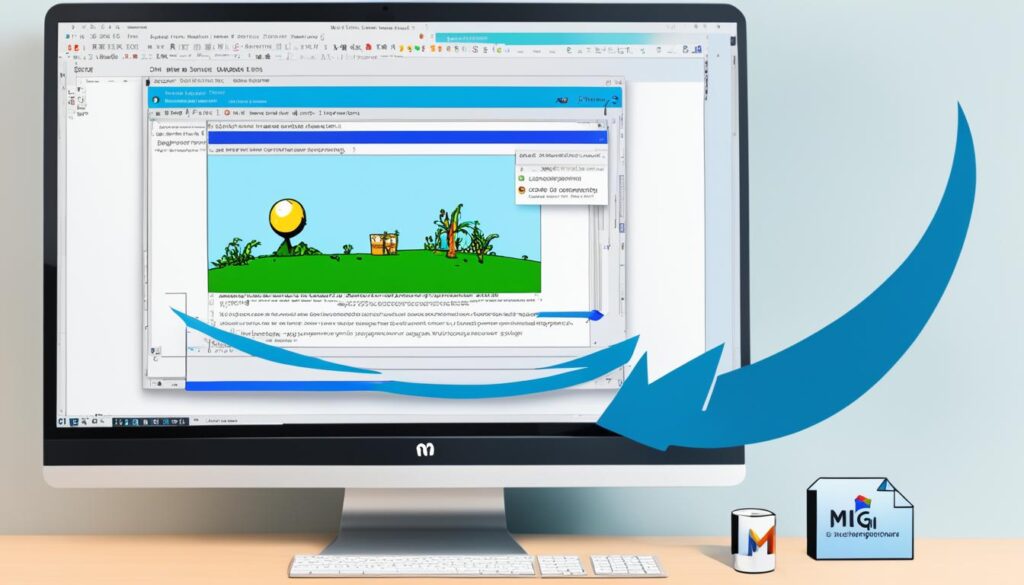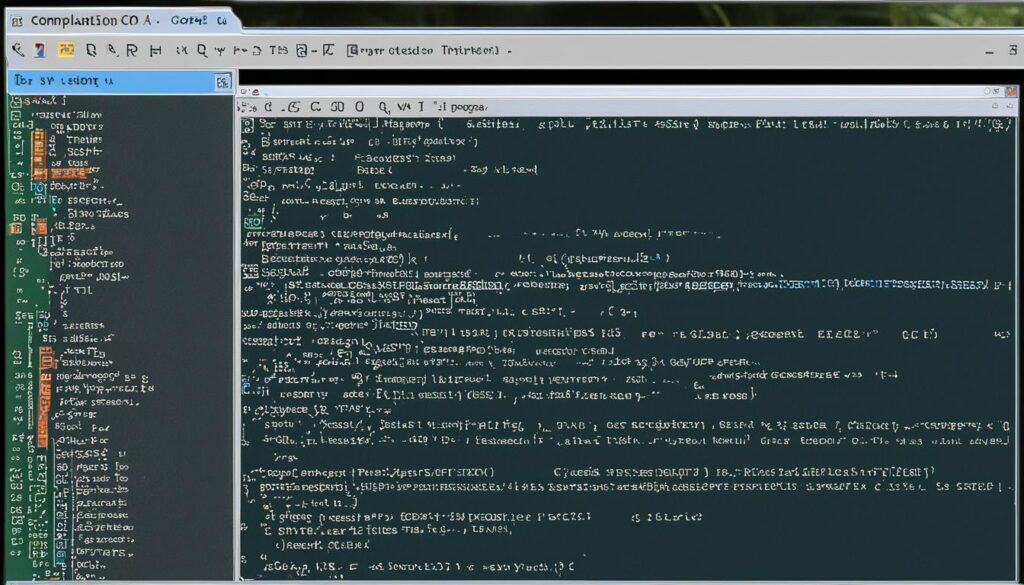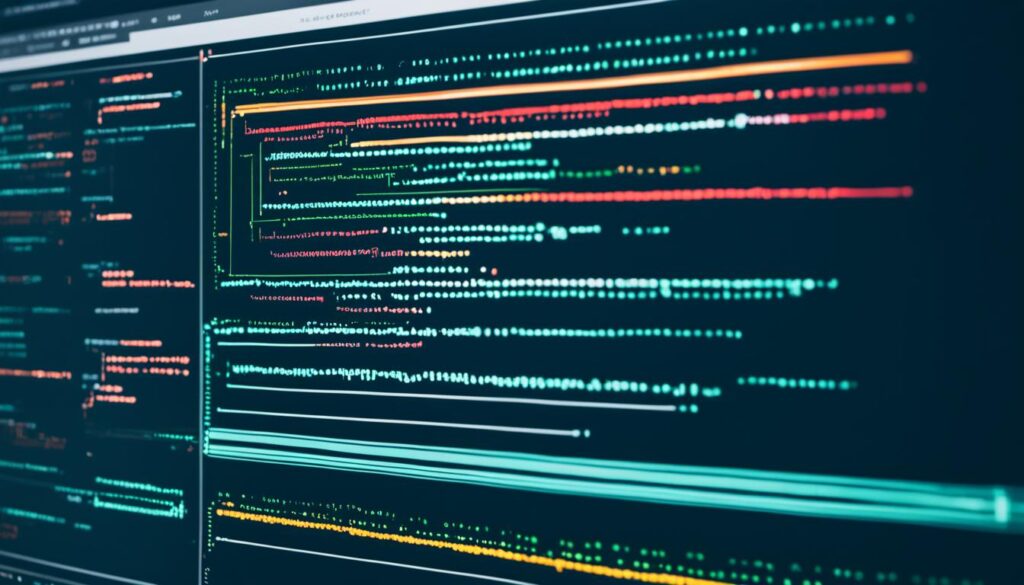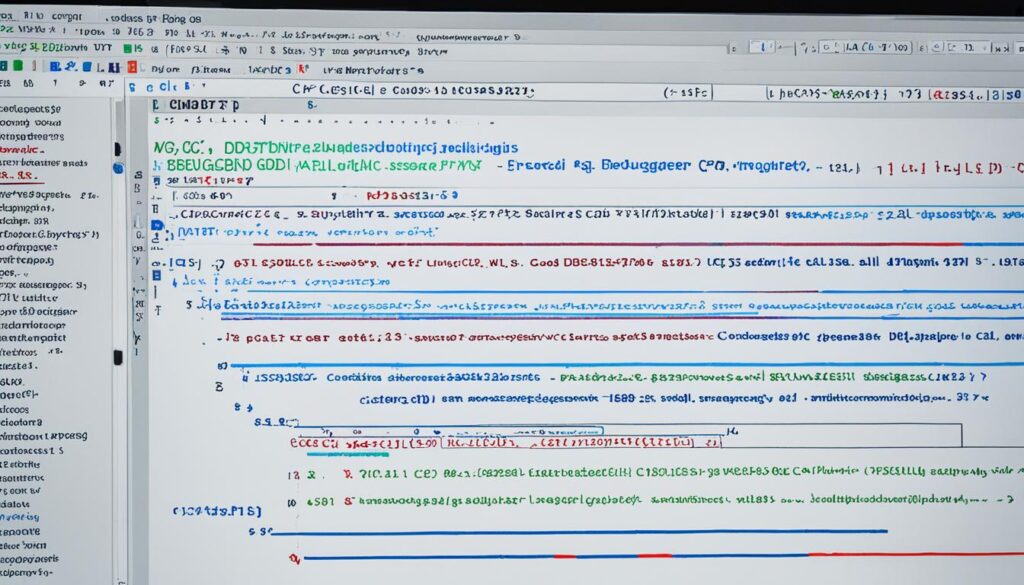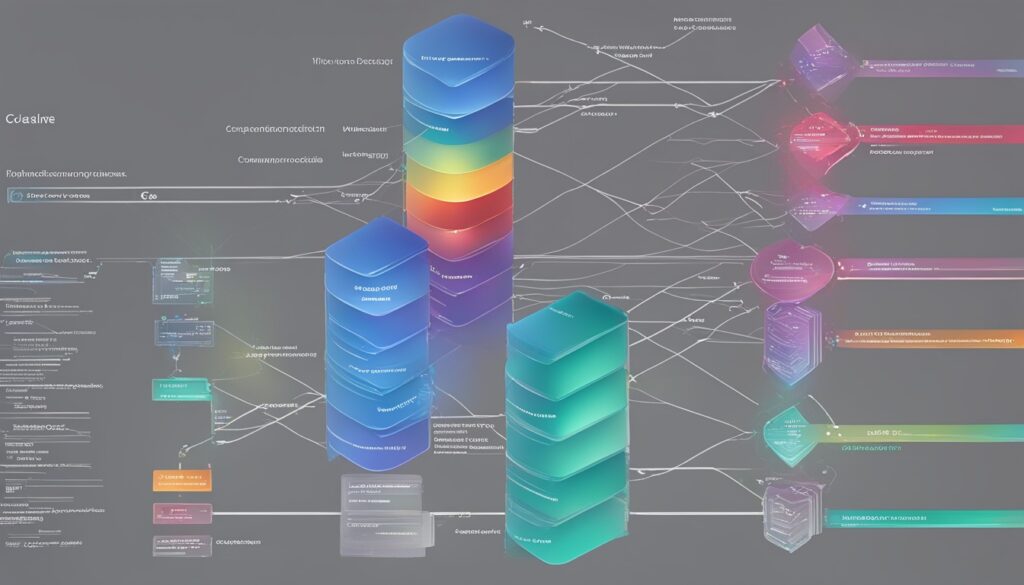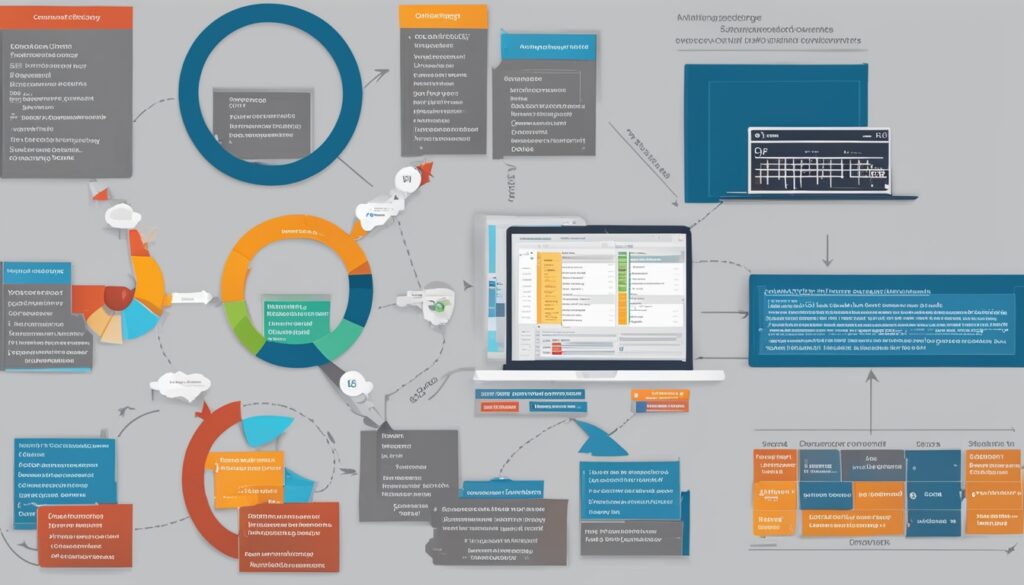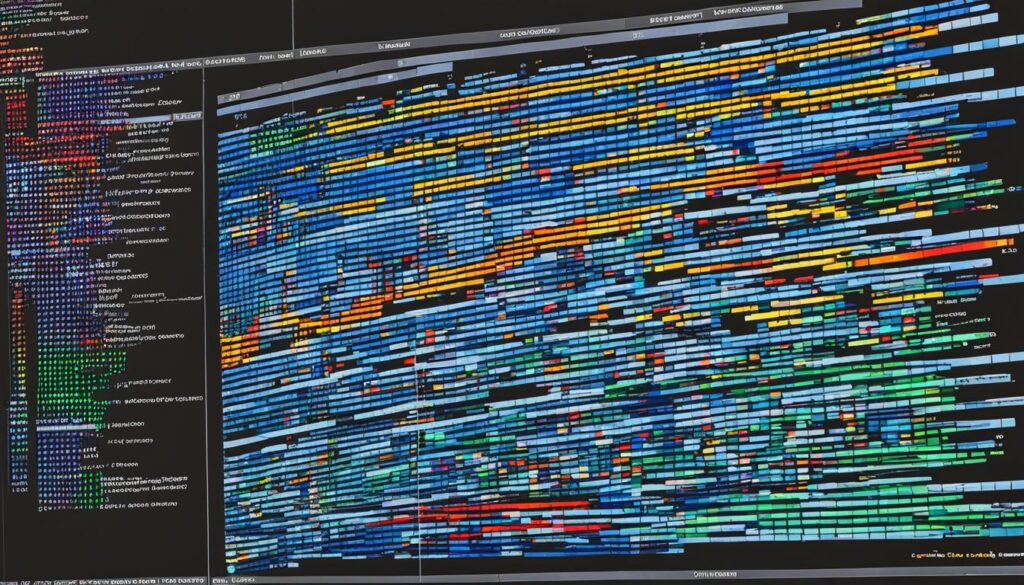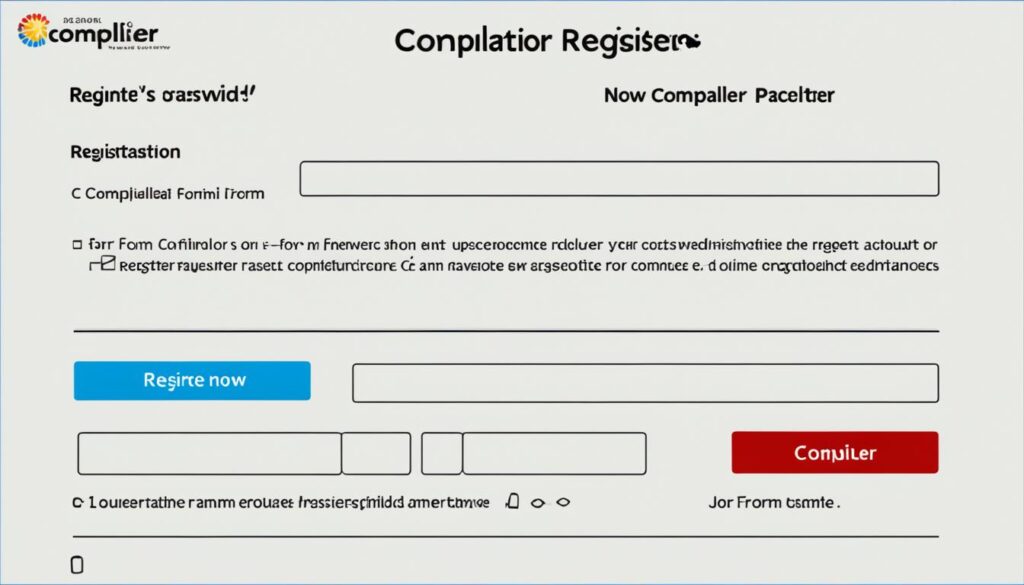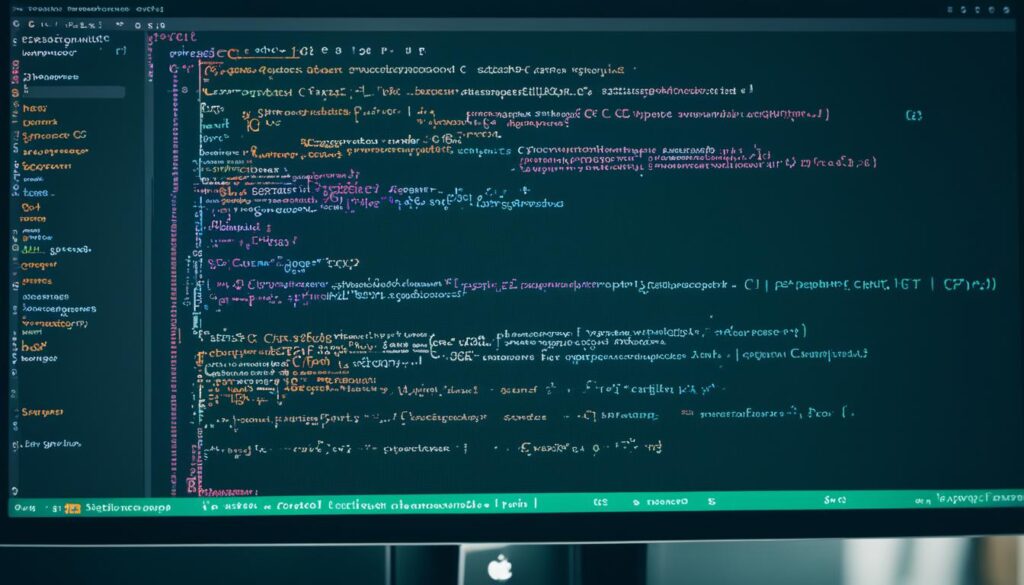Have you ever wondered why programmers love their development tools so much? It’s often because of the tools they use. With the dev c++ free download, we get a powerful C++ IDE that makes coding easier.
Dev C++ is open-source software that’s a key part of our programming tools. It has features for both new and experienced developers. By knowing what it offers, we can work more efficiently and explore more in programming.
Introduction to Dev C++
Dev C++ is a top tool for programmers. It’s more than just a source code editor. It also has a compiler and debugger, making it a full programming environment. This makes it great for creating, editing, and compiling C++ code efficiently.
Dev C++ is special because it’s open-source. This means users can help improve and change the software. It’s flexible, so developers at all levels can use it to make their coding better. This helps with learning and working on projects.
Looking into Dev C++ features shows it meets many programmers’ needs. It has a user-friendly interface and powerful debugging tools. Every part is made to make programming easier. This helps users write better code and work more efficiently.
Why Choose Dev C++ as Your C++ IDE?
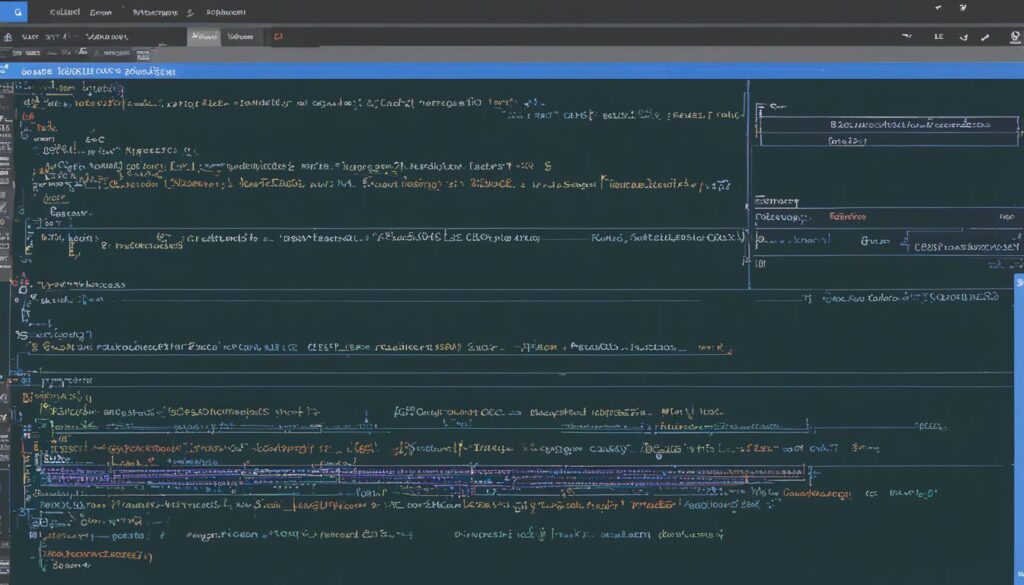
Choosing Dev C++ as your Integrated Development Environment (IDE) comes with many benefits. It’s easy to install, making it great for both new and experienced developers. It also runs smoothly, perfect for any coding task, big or small.
Dev C++ works well with many C++ standards. This makes it a flexible choice for a wide range of projects. The community keeps it updated with the latest security and features, improving the user experience.
The intuitive user interface of Dev C++ is another big plus. It helps new users get around easily and lets experienced programmers work more efficiently. This focus on ease of use is a key benefit of C++ programming.
In short, Dev C++ stands out with its ease of use, powerful features, and strong community support. We recommend exploring these qualities to fully enhance your coding skills.
Features of Dev C++
Dev C++ is a top choice for developers thanks to its many features. It’s easy to use, making coding smooth and enjoyable. This helps us work better and faster.
User-Friendly Interface
The interface of Dev C++ is simple, letting us focus on writing code. It gives us fast access to important tools. This makes it easy for beginners to start coding quickly.
Integrated Debugger
Dev C++ shines with its debugging tools. These tools help us find and fix code problems easily. Debugging becomes easier, letting us work with confidence and speed.
Customizable User Experience
Customizing our development tools is key. Dev C++ lets us set up the IDE to fit our needs. This makes working more comfortable and boosts our productivity and efficiency.
dev c++ free download: How to Access It
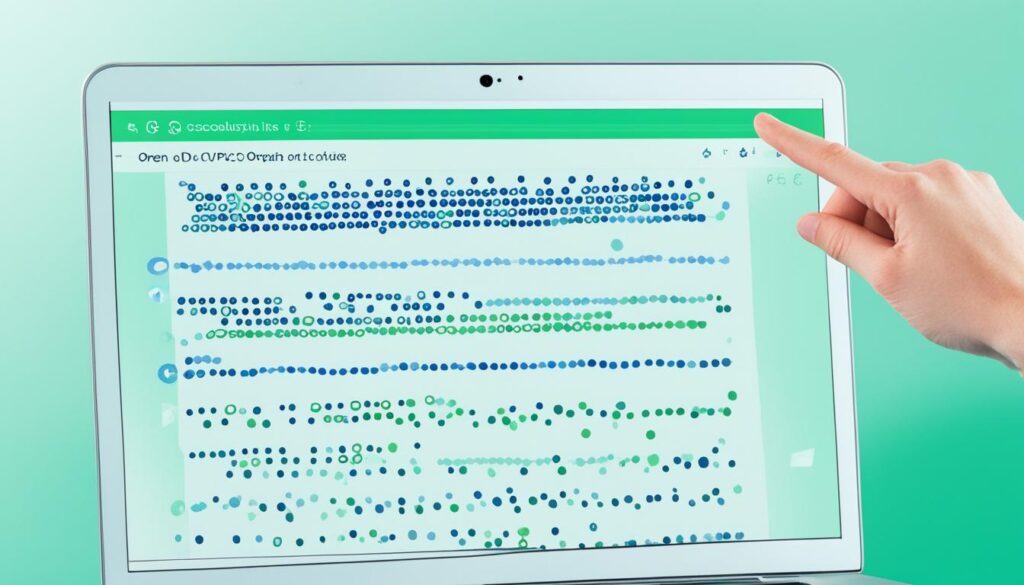
Getting Dev C++ is easy and can make coding better. We should use official Dev C++ download links from the website or trusted software sites. This way, we get the newest version safely.
Here are the steps to get Dev C++:
- Visit the official Dev C++ website or a trusted software repository.
- Find the download section and look for clear download links.
- Pick the right version for your system (32-bit or 64-bit).
- Click on the download link and wait for the file to download completely.
Stay away from unofficial sites or shady links to avoid risks. Using trusted sources keeps the software safe and true.
Downloading Dev C++ is simple with the right links. Just follow these steps to get the IDE and a great tool for C++ programming.
| Source | Link Type | Notes |
|---|---|---|
| Dev C++ Official Website | Direct Download | Most reliable source for the latest version |
| CNET Download | Trusted Repository | Widely used for various software downloads |
| Softpedia | Trusted Repository | Known for safe downloads, includes user reviews |
System Requirements for Dev C++
Before we start coding, we need to make sure our systems meet the Dev C++ requirements. This makes sure our IDE works well and runs smoothly.
Dev C++ has different specs for installing and running. It’s important to check if your operating system is compatible. It works on Windows XP and later, making it easy for many users.
| Component | Minimum Requirements | Recommended Requirements |
|---|---|---|
| Operating System | Windows XP | Windows 10 or later |
| CPU | 1 GHz | 2 GHz or higher |
| RAM | 512 MB | 2 GB or more |
| Hard Disk Space | 30 MB | 100 MB or more |
It’s key to meet the Dev C++ system requirements for making efficient C++ apps. Knowing what we need helps us set up our coding space right. This way, our environment supports the full range of the IDE’s features.
If you want to get better at coding, check out ABAP modularization techniques. They can really improve your code’s quality and make it easier to maintain.
How to Install Dev C++
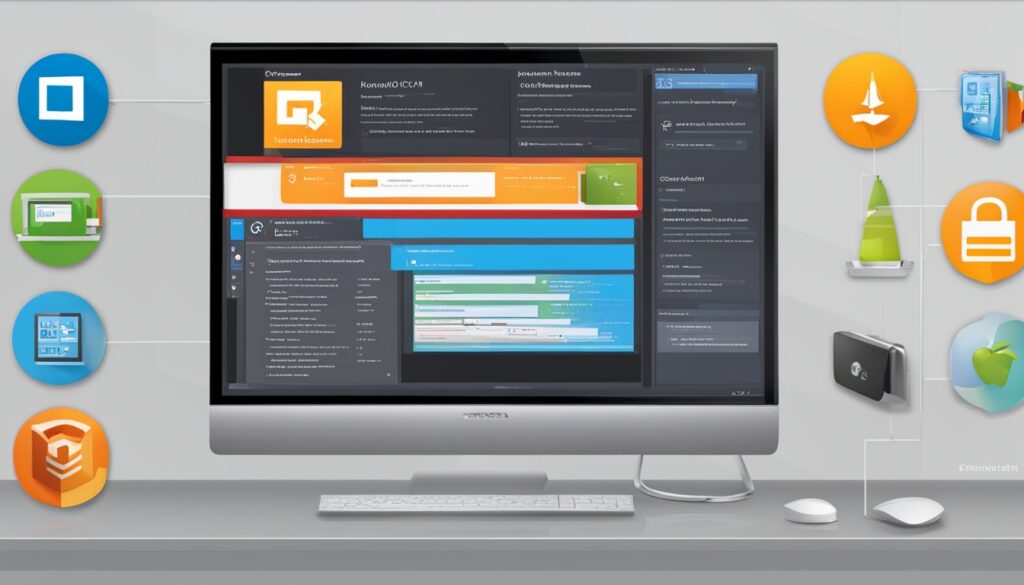
Installing Dev C++ is easy with a detailed Dev C++ installation guide. We’ll go through each step of the setup. We’ll also cover common problems and how to fix them.
Step-by-Step Installation Guide
- Start by downloading the Dev C++ installer from the official website.
- Find the downloaded file and double-click to start the setup.
- Read and agree to the license to move forward.
- Pick where you want to install it or use the default option.
- Choose what you want to install, like the IDE and compilers.
- Click install and wait for it to finish.
- After it’s done, open Dev C++ to check if it works.
Troubleshooting Installation Issues
Sometimes, we hit common installation problems. Here are some tips to fix them:
- Compatibility Issues: Make sure our OS meets Dev C++’s system requirements.
- Installation Errors: Turn off antivirus software while installing to prevent issues.
- Missing Components: Reinstall and make sure all components are checked.
Dev C++ as a C++ Compiler
The Dev C++ compiler is a powerful tool for making C++ programs run smoothly. It has a user-friendly interface that makes it easy for both new and experienced developers to use. We can quickly compile our C++ programs and get instant feedback on any errors, which helps improve our coding skills.
One of the main features of Dev C++ is its connection with MinGW. This lets us use different compilers and settings for our projects. Having more compiler options means we can work more efficiently and effectively.
Dev C++ is also known for its efficiency. It makes compiling faster, so we can spend more time improving our code. This makes it a top choice for many software developers.
Whether we’re building simple apps or complex systems, Dev C++ always gives us reliable results. It helps us test and debug quickly, so we can keep refining our code until it works perfectly.
Creating Your First C++ Program in Dev C++

Starting our C++ programming journey means setting up a coding environment. With Dev C++, we can create a workspace that helps us develop. This is key for making our first C++ program.
Setting Up Your Coding Environment
A good coding environment makes programming better. Here’s how to set up Dev C++:
- Open Dev C++ and select Tools from the menu.
- Choose Compiler Options and adjust settings as needed.
- Select File > New > Source File to start a new program.
With our environment ready, we can start writing our first C++ program.
Writing Hello World
The Hello World program is a classic first step in programming. In our new file, we’ll add this code:
#include <iostream>
int main() {
std::cout << "Hello, World!" << std::endl;
return 0;
}
This code makes the program print “Hello, World!” on the screen. It’s important to follow the syntax rules. After writing, we’ll compile it to find errors. If there are no errors, running it will show our first output!
By doing this Hello World tutorial, we build confidence in using Dev C++ and programming basics. Setting up our environment and writing our first C++ program is crucial for our coding journey.
Utilizing Dev C++ for Efficient Development
Using Dev C++ can make our coding more efficient. It helps us work better and faster. We can organize our code well with Dev C++.
This means our projects are easier to understand and manage. We can track many files and dependencies with Dev C++’s project management tools. This reduces errors when coding.
Good coding habits, like using the same naming style and breaking code into modules, make our work better. This way, we can handle big projects together more smoothly.
Debugging is key, and Dev C++ helps a lot here. Its debugger lets us find and fix code problems quickly. Testing our code often makes it more reliable and helps us manage projects better.
In short, using these strategies with Dev C++ boosts our coding efficiency. It helps us and our teams succeed in making software.
| Strategy | Description | Benefit |
|---|---|---|
| Code Organization | Use clear structure and comments | Improves navigation and maintenance |
| Project Management Features | Track multiple files and dependencies | Minimizes errors during coding |
| Consistent Naming Conventions | Employ uniform naming for files and functions | Aids in collaboration and understanding |
| Integrated Debugger | Utilize tools for error tracking | Facilitates quick identification of issues |
| Frequent Testing | Implement systematic testing protocols | Enhances reliability and efficiency |
Comparing Dev C++ to Other C++ IDEs
Choosing the right C++ IDE can greatly change our programming experience. Dev C++ stands out with its unique features. But, it’s important to know how it stacks up against Code::Blocks, Eclipse, and Visual Studio. This helps us make better choices.
Strengths of Dev C++
- Simplicity: Its easy-to-use interface is great for beginners.
- Lightweight: It doesn’t use a lot of resources, making it fast and suitable for older computers.
- Integrated Debugging: Debugging is easy, helping both new and experienced developers.
- Customizable Environment: Users can tailor their settings to work better for them.
Limitations of Dev C++
When talking about Dev C++, we must also point out its downsides.
- Feature Gaps: It lacks some advanced tools found in Visual Studio and Eclipse, which can limit complex projects.
- Less Frequent Updates: Updates don’t come as often, which can delay new features and bug fixes.
- Support Limitations: The community support might not be as strong, making it harder to solve problems.
| Feature | Dev C++ | Code::Blocks | Eclipse | Visual Studio |
|---|---|---|---|---|
| Ease of Use | High | Moderate | Moderate | Low |
| Performance | Excellent | Good | Average | Requires High Specs |
| Features | Basic | Moderate | Advanced | Comprehensive |
| Integration | Limited | Good | Excellent | Excellent |
| Community Support | Moderate | Strong | Very Strong | Very Strong |
Exploring Additional Programming Tools
We’re always looking to improve our coding skills. That’s why we use different programming tools, including Dev C++. These tools make our work easier and give us more power as developers.
Plugins are a great way to make our IDE better. They let us change our coding environment to fit what we need for each project. With plugins, we can get things like better syntax highlighting and tools for refactoring code.
Version control systems are key for keeping track of changes in our projects. Tools like Git help us manage these changes and work with other developers. Using version control keeps our code tidy and makes it easier to work with a team.
Online coding platforms are also great for improving our skills. Sites like Codecademy and LeetCode let us try coding challenges and join competitions. These platforms give us feedback right away and connect us with others who code.
Using different programming tools makes coding better for us. With tools like plugins, version control, and online platforms, we can always get better at coding. This makes our coding work both effective and fulfilling.
Using Dev C++ for Advanced Coding Projects
Starting advanced C++ projects with Dev C++ boosts our productivity and effectiveness. It’s key for handling complex tasks and smooth development.
Dev C++ lets us set up our projects with specific settings. We can organize files, add libraries, and manage dependencies well. This early planning saves time later on.
Using agile development helps us with complex C++ projects too. We break tasks into smaller pieces, work fast, and adjust our goals as needed. This approach promotes teamwork and new ideas.
To make our apps better, we suggest checking out C++ libraries. These libraries speed up development and teach us about C++ best practices.
Working on tough projects in Dev C++ improves our C++ skills. With ongoing practice and learning new techniques, we can make complex apps. This shows our growth as developers.
Open Source Software and Community Support
Dev C++ is open source, which means it has a strong community that makes programming better. Many programmers contribute their skills and knowledge. This makes the development environment stronger.
Being part of an active community gives us access to great support and resources for Dev C++.
Accessing Online Resources
There are many online places to find help for programmers. Forums and boards for Dev C++ are full of advice from those who know the ropes. You can find tutorials online for all skill levels, making learning to code easier.
Projects on GitHub let us see how different codes work. This is a great way to learn from others and share our own work.
Benefits of Community Contributions
The community’s ongoing support is key to Dev C++’s success. New features and fixes come out often, keeping the software modern and easy to use. By talking with others and sharing our code, we gain from their experiences.
This creates a deep well of knowledge that helps us all improve. It also encourages new ideas and growth in the open source world.
Common Issues and Solutions in Dev C++
When using Dev C++, we might run into some common problems that can slow us down. By learning how to fix these issues, we can make coding easier. Here, we’ll look at typical problems and how to solve them.
- Compilation Errors: These often happen because of mistakes in the code or wrong settings. To fix this, we should check our code and the project settings again.
- Linking Problems: If programs won’t run, it might be because of library issues. Checking the library paths and making sure all needed libraries are there can solve this.
- Performance Concerns: Slow running or lag can come from bad code or not enough memory. Making our code better and keeping an eye on system resources can help.
To wrap it up, solving Dev C++ problems means finding and fixing these common issues. By focusing on errors, library issues, and speed, we can improve our coding a lot.
| Common Issues | Potential Causes | Solutions for Users |
|---|---|---|
| Compilation Errors | Syntax mistakes, incorrect file settings | Check code syntax, review project settings |
| Linking Problems | Missing libraries, incorrect library paths | Verify library paths, ensure required libraries are included |
| Performance Concerns | Inefficient code, low memory | Optimize code, monitor system resources |
Tips for Maximizing Your Experience with Dev C++
To get the most out of Dev C++, we can use several strategies. These tips will make our coding work better and more efficient. Here are some ways to improve our coding experience:
- Utilize Keyboard Shortcuts: Learning keyboard shortcuts helps us move faster through our code. This saves a lot of time.
- Code Formatting: Keeping our code formatted consistently makes it easier to read. It also helps with managing projects and working with others.
- Comment Your Code: Adding comments to our code makes it clear what each part does. This is very helpful when we come back to our projects later.
- Optimize Project Settings: Changing compiler settings for our projects can make building faster and more efficient.
- Use Version Control: Using systems like Git helps us keep track of changes. We can easily go back to previous versions if needed.
Using these tips can greatly improve our coding experience. Over time, we’ll see better results and enjoy coding more.
Conclusion
In this article, we looked at the benefits of Dev C++. We talked about its easy-to-use interface, built-in debugging tools, and customizable options. These features make coding more efficient.
Dev C++ is a powerful tool for programmers. It helps improve our skills and makes coding easier. We recommend downloading Dev C++ for free. It’s great for both new and experienced programmers.
This IDE lets us manage our projects well and improve our coding skills. It’s a supportive place to grow as a programmer.
As we wrap up, think about how Dev C++ is a great choice for learning C++. It’s open-source and has a strong community backing it. This makes it perfect for anyone wanting to get better at programming.
FAQ
What is Dev C++?
Dev C++ is a free, open-source C++ development environment. It’s great for creating C++ programs. It comes with a code editor, compiler, and debugging tools. This makes it easy for developers to write, compile, and test their code.
How can we download Dev C++ for free?
We can get Dev C++ for free from its official website or trusted sources. It’s important to download from safe places to keep our software safe and secure.
What are the system requirements for running Dev C++?
Our system needs Windows XP or higher to run Dev C++. It should also have a compatible CPU, at least 1GB of RAM, and enough storage space. Checking these specs helps ensure the IDE runs well.
Can we use Dev C++ as a C++ compiler?
Yes, Dev C++ comes with a C++ compiler. This lets us compile our C++ programs easily. It supports various compilers, like MinGW, for flexibility in our projects.
How do we create our first C++ program using Dev C++?
To make our first C++ program, we set up our coding space in the IDE. Then, we write the “Hello World” program. There are detailed steps to follow for writing, compiling, and running the program.
What are the advantages of using Dev C++ compared to other C++ IDEs?
Dev C++ has easy installation, is lightweight, and has a user-friendly interface. It also has an active community for support and regular updates. This makes it a strong choice for programmers.
What troubleshooting steps can we follow if we experience issues with Dev C++?
If we run into problems with Dev C++, like compilation errors or slow performance, we can fix them. Check our code for errors, make sure settings are right, and look up community solutions.
Are there additional programming tools that complement Dev C++?
Yes, there are tools that can make using Dev C++ better. These include plugins for extra features, version control for managing projects, and online platforms for learning.
How can we maximize our experience while using Dev C++?
To get the most out of Dev C++, use shortcuts for moving around, follow good coding practices, and manage projects well. These tips can boost our productivity and improve our programming results.





